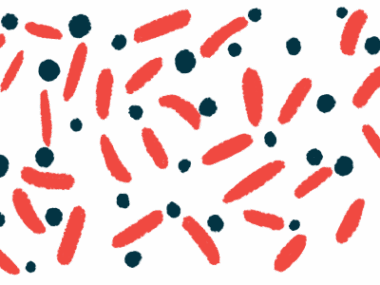XF platform to be tested against CF-related MRSA lung infection
How mucus buildup impacts XF-73's antibacterial activity also will be assessed
Written by |

Destiny Pharma is launching a research program to test a potential therapy derived from its XF drug platform for methicillin-resistant Staphylococcus aureus (MRSA) lung infections in people with cystic fibrosis (CF).
The program will test the potency of an experimental treatment known as XF-73 in MRSA samples from CF patients in the U.S. Researchers also will assess how thick, sticky mucus building up in patients’ lungs, a hallmark of CF, impacts the treatment’s antibacterial activity.
The research is partly supported by the Cystic Fibrosis Foundation (CFF) and will be conducted at the CFF National Resource Center for Microbiology at Seattle Children’s Hospital.
“The challenge here will be to explore our drug activity in the presence of mucus which forms a major barrier, causing antibiotic treatment failure,” Bill Love, Destiny’s chief scientific officer, said in a company press release.
Testing XF-73 in lung infections
Mucus accumulating in CF traps and promotes the proliferation of microorganisms that cause lung infections.
A common cause of such infections is S. aureus. Persistent use of methicillin antibiotics has led to the development of MRSA strains, which may worsen CF patients’ symptoms and lung function decline.
The resistance of MSRA to antibiotics may come from its ability to form biofilms, where bacteria grow attached to a surface in moist environments, which protect it from antibiotics and the body’s immune defenses.
XF-73 (exeporfinium chloride), is one of the molecules created through Destiny’ XF platform, which features a novel, ultra-rapid mechanism to lower the chance of bacteria becoming resistant.
Previous work on MRSA strains isolated from a mouse model of skin infection showed the antibacterial activity of XF-73 was at least similar to most of the tested antibacterial drugs. A study by Destiny showed XF-73 had antibacterial activity against 840 MRSA samples isolated from patients around the world. Also, data from a burn wound model to be presented this year shows a single topical administration of XF-73 prevented MRSA from reaching the bloodstream compared with a topical placebo.
“We are excited to initiate this vital research and have high hopes of demonstrating potentially useful activity of XF-73 given our recent publication of activity against hundreds of MRSA strains and activity against bacteria within biofilms,” Love said.







